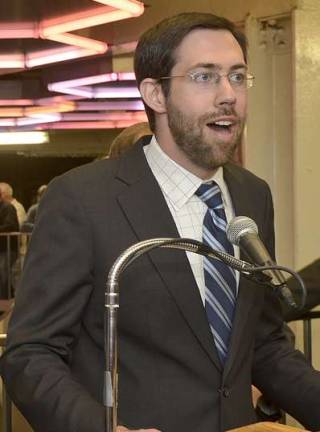Strength in Numbers

Sen. Dan Squadron's grassroots campaign for public advocate paying dividends When it comes to financing his still unofficial campaign for New York City's public advocate post, Manhattan/Brooklyn Sen. Daniel Squadron is in many ways taking the road less traveled. With a decidedly grassroots approach to fundraising which favors dainty donations from a diverse field mostly made up of city residents, Squadron, now serving his third term in the city's 26th Senate District, is getting the biggest bang for the buck out of the five likely candidates. According to his campaign, Squadron has raised a total of $1.75 million in direct contributions and expected public matching funds, but he has spent only $150,000, leaving $1.6 million in contributions and matching funds to spend on the race between now and the Democratic primary. The city's campaign finance board confirms that Squadron has raised more money than any of his four competitors, of whom only one, Cathy Guerriero, a business consultant and teacher, has formally announced her candidacy. Squadron's other likely competitors for the office of public advocate are Reshma Saujani, a former deputy public advocate under Bill de Blasio; Brooklyn Council member Letitia James; and Noah Gotbaum, an education activist on the Upper West Side and also the stepson of former Public Advocate Betsy Gotbaum. In a recent press release, Betsy Gotbaum stated she would endorse Squadron instead of her stepson Noah. News reports said that Gotbaum had committed to Squadron's campaign months before her stepson decided to shoot for the public advocate's office. "Daniel Squadron has the passion and the experience to be a great public advocate for all New Yorkers," Gotbaum, who held the office from 2002 to 2009, said in a release from Squadron's campaign. "He has always fought for families and those left out and left behind." The position of public advocate has only been in existence since 1994 and has been held by just three people: Mark Green from 1994-2001, Betsy Gotbaum from 2002-2009 and, since 2010, Bill de Blasio, who is now a candidate for mayor. As a voice for all the residents of New York City, the public advocate is similar to the role of watchdog, ensuring that all residents get the services, rights and protections they are entitled to. "I want to make this a city for more families," Squadron said. "The advocate is a role really about giving a voice to individuals who need one." Among the key issues Squadron says he'll address as advocate are transportation, public housing and development of small business. "Daniel radiates the kind of energy, smarts and guts that are a perfect fit with the office of public advocate," said Green, the city's first public advocate, in a statement. "He knows when to bring people together and when to stand up to a mayor on behalf of those left behind or out. His record on child care, housing, guns and money in politics reflect the values that the office and city need." And Squadron, who prides himself on having never taken corporate or special interest PAC money, has maximized his grassroots support to the tune of nearly 1,500 individual contributors, of whom nearly 90 percent contributed less than $250. In addition, he said that 150 supporters hosted private, small fundraisers. Most recently, Sen. Kirsten Gillibrand attended a dim sum fundraiser in Chinatown in support of Squadron's campaign. Other small fundraisers were hosted by Paul Newell, Democratic district leader for New York's 65th Assembly district, and David Gruber, chair of Community Board 1. "2013 will be a pivotal year of transition for our city-and New York families need a fighter who is ready and willing to stand up for them," Squadron said. "I'm incredibly honored by this show of support from New Yorkers around our city, and it's clear we will have the resources to run an aggressive, five-borough campaign." Sean Sweeney, director of the SoHo Alliance, said that seeking out many, smaller donations instead of just a few lavish ones, was productive on many levels. "Strategically, it's a smart idea to get many smaller donations because that way, you build a base," he said. Discussing campaign finance reform, Squadron said the state should emulate the city. "The city's system is what the state should be using," he said. "The state system, now and for some time, has been about special interests giving extraordinarily large sums." Squadron added that the city system is more about getting thousands of people involved at whatever level of giving they're comfortable with. "In New York City, the way to be successful is to get lots and lots of people involved."